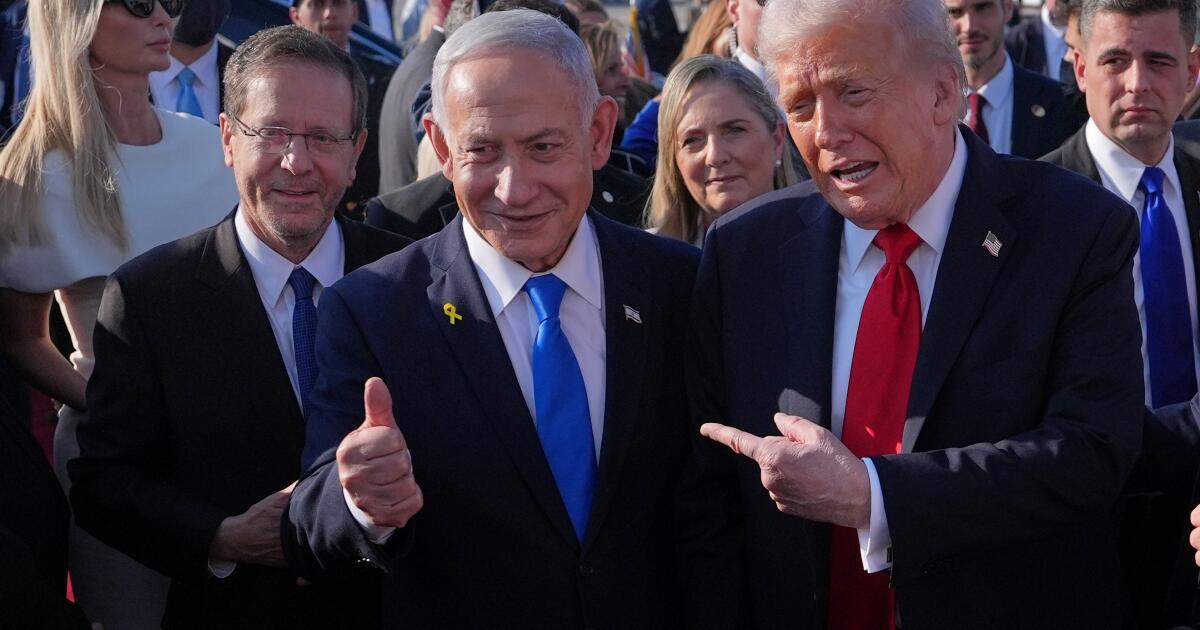As Trump pushes for peace, Netanyahu talks up Israel’s military might
WASHINGTON — President Trump is declaring Israel’s war with Hamas in the Gaza Strip over and has already barreled ahead toward far larger goals — arguing that the fragile ceasefire his administration helped broker is a chance to bring a lasting peace to the greater Middle East.
Israeli Prime Minister Benjamin Netanyahu is equally exuberant about the present, but far more measured in his assessments going forward. He’s characterized the deal, which is still in its early stages, as “a proposal to free hostages and end the war” while also saying that his country used two years of often brutal war in Gaza to showcase its military might.
The pair seemingly offering strikingly different perspectives about the prospects for future peace is noteworthy given just how much each lavished the other with praise during speeches before the Knesset, Israel’s parliament, on Monday.
But it also reflects just how different the political and diplomatic stakes may be for each leader going forward.
That’s especially true given that Trump could see his reputation as an international dealmaker tested by a ceasefire that could yet prove precarious, while Netanyahu may have to focus on domestic issues and keeping the Israeli electorate happy given that he’s set to face election no later than next October.
‘You’ve won’ vs. ‘Our enemies now understand’
Trump gleefully added the Israel-Hamas war as No. 8 on the list of global conflicts he’d claimed to have solved — even if that tally exaggerates the role he played in calming some global hot spots. He also declared that the ceasefire would usher in a new “dawn of a new Middle East.”
“You’ve won,” he said of Israel, encouraging the U.S. ally to see the limitations of military force in bringing about enduring peace. “Now it is time to translate these victories against terrorists on the battlefield into the ultimate prize of peace and prosperity for the entire Middle East.”
That followed Netanyahu using his own speech to say, “Our enemies now understand just how powerful and just how determined Israel is.”
Recalling Hamas’ attack on Israel two years ago that sparked the war, he had a message for his country’s adversaries: “Understand that attacking Israel on Oct. 7 was a catastrophic mistake.”
Referring to the militant group Hamas, Netanyahu said, “These monsters take babies as hostages,” adding that “Israel did what it had to do.”
Over the last two years, Netanyahu was steadfast in vowing to achieve “total victory” over Hamas — not only returning the hostages released as part of the ceasefire agreement, but also disarming the group and pounding it into surrender. With Hamas weakened but still intact, he’s fallen far short of that goal.
Trump’s plan also holds out the possibility of Palestinian statehood one day — something that Netanyahu and his coalition partners oppose. By declaring an end to the war, Netanyahu could see his government crumble and be forced into an early election at a time when his popularity remains low and his war goals remain unfulfilled.
‘Economic development’ vs. ‘Civilization against barbarism’
Trump has long approached diplomacy as he would dealmaking in the business world. He’s now saying that promoting economic interests in the greater Middle East can help bridge divides and foster cooperation — even among the most bitter of historical foes.
The president suggested Monday that wealthy Arab countries would be willing to help finance an end to the fighting to promote prosperity in one of the world’s most volatile regions.
“The total focus of Gazans must be on restoring the fundamentals of stability, safety, dignity and economic development,” Trump said.
Netanyahu said he hoped the future would bring “peace inside Israel and peace outside Israel.” But rather than echo Trump’s excitement about regionwide unity through economic development, he called for a future “that will unite civilization against barbarism, light against darkness and hope against despair.”
‘Ready when you are’ vs. ‘Terror axis’
Another key point where Trump and Netanyahu diverged was on Iran.
Trump praised U.S. strikes in June, which he has characterized as a knockout blow against Iran’s nuclear program: “We took a big cloud off of the Middle East and off of Israel.”
But he also acknowledged that Tehran may have a role in helping achieve larger Middle East peace, saying that when it comes to Iran and possible negotiations, officials in the U.S. “are ready when you are.”
“You know what would be great, if we could make a peace deal with them,” Trump added of Iran. “Would you be happy with that? Wouldn’t it be nice? Because I think they want to. I think they’re tired.”
In a speech that often drew raucous cheers from Israeli lawmakers, that particular sentiment elicited a muted response. Netanyahu, meanwhile, saluted his country’s “amazing victories over Hamas and the entire Iranian terror axis.”
‘Little dot’ vs. ‘Hamas’ false propaganda’
Both leaders spoke about mounting international pressure on Israel to end the war — but to different ends.
Netanyahu chastised the global community for having “bought into Hamas’ false propaganda” and said that doing so saw “more and more governments succumb to antisemitic mobs in their own countries” while pushing for Israel to “surrender to Hamas demands.”
Doing so, he said, would have meant that “in no time, the Hamas killers would be back on the border fence, ready to repeat the horrors of October 7th again and again.”
Trump, by contrast, suggested that Israel might have been unable to continue fighting with Hamas for much longer amid outside opposition from so many corners of a world he noted was very big — even while praising Israel’s military and political strength.
The sheer number of people in Gaza killed during the war, the widespread destruction there, and an ongoing starvation and humanitarian crisis, sparked allegations of genocide denied by Israel.
“This piece of land is very small,” Trump said. “You have this little dot, and think of what you’ve done. It’s incredible.”
Mutual admiration. But no joint participation in Egypt summit
Trump hailed Netanyahu repeatedly, and even took the extraordinary step of suggesting that the prime minister be pardoned in an ongoing corruption inquiry.
“Cigars and champagne, who the hell cares about that?” Trump asked.
That was a reference to three corruption cases for which Netanyahu has been indicted. One involves accusations the prime minster and his wife accepted luxury goods — including cigars and champagne — in exchange for political favors.
After Trump was snubbed by the Nobel Peace Prize committee last week, Netanyahu promised to nominate Trump as the first non-Israeli to receive the Israel Prize, the country’s highest honor.
Still, such praise didn’t lead to both men heading to Egypt after finishing their speeches.
Trump left Israel to attend what the White House has billed as a “ peace summit ” featuring 20-plus world leaders in Sharm el Sheikh, Egypt. Netanyahu was invited, but declined Monday. His office said it was too close to the Jewish holiday of Simchat Torah.
Weissert writes for the Associated Press.

